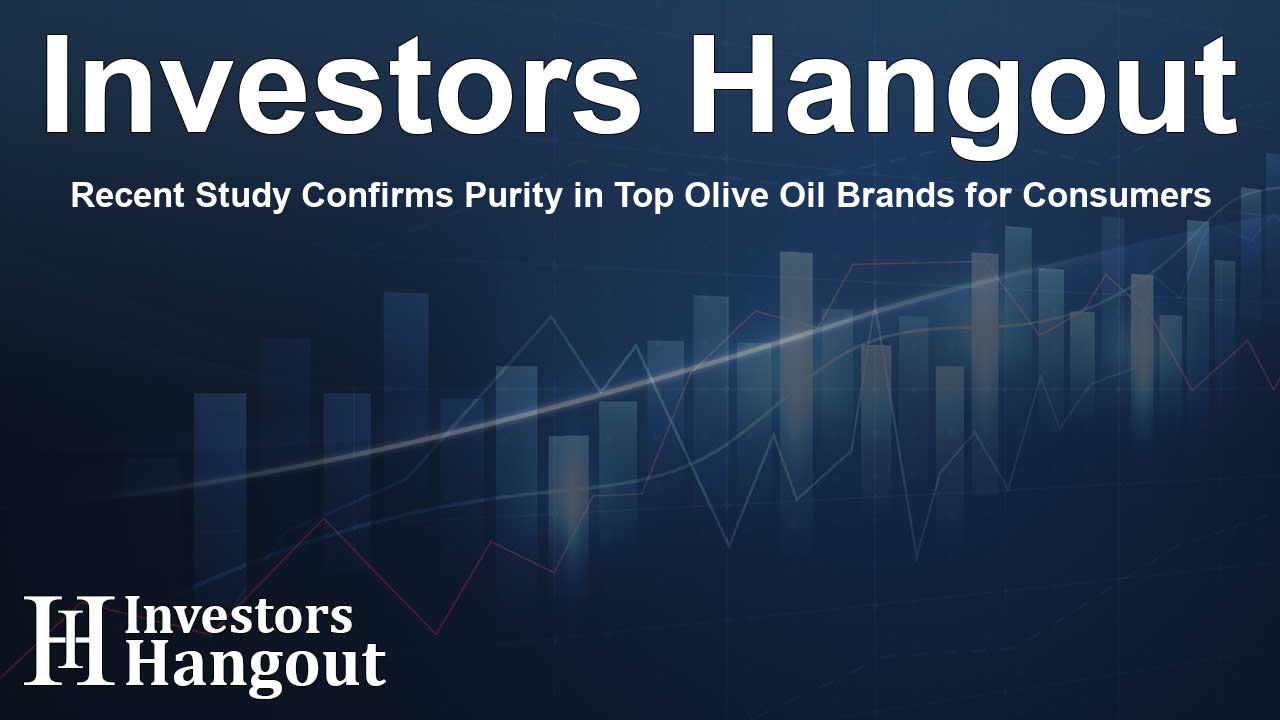Recent Study Confirms Purity in Top Olive Oil Brands for Consumers

Comprehensive Olive Oil Testing Shows Positive Results
A recent extensive study on olive oil has provided reassuring news for consumers: no adulteration has been detected in 190 samples taken from the top 15 olive oil brands, which covers about 85% of the market, including 37 private label products. This independent research reinforces the integrity of leading brands found in stores.
Research and Oversight by Experts
This thorough testing program was steered by Dr. Tassos C. Kyriakides, a noted assistant professor of biostatistics at Yale University, ensuring the investigation met high standards of scientific rigor. Independent third-party sampling agencies and laboratories recognized by the International Olive Council conducted the assessments, reinforcing their credibility.
Health Benefits Evidenced
The findings, as indicated in the study, confirm that the tested extra virgin olive oils meet critical health parameters, namely the content of oleic acid and phenolic compounds. These health benefits persist even in oils that may not have met the overall quality grade standards.
Insights from Industry Leaders
Joseph R. Profaci, the NAOOA Executive Director, expressed satisfaction with the results, highlighting that consumer concerns about potential adulteration with less desirable oils have been largely alleviated. He noted that these findings align with NAOOA's internal testing over previous decades, which has consistently shown high-quality standards in certified oils.
Insights from the Testing Protocol
The testing not only targeted leading brands but also included a less-than-1% representation from lesser-known brands, revealing that some did indeed have issues with adulteration. Notably, products sold at suspiciously low prices raised red flags as potential adulterated items.
Consistent Quality in the Face of Market Changes
While the study's results are promising, they also indicate the need for ongoing vigilance against economic adulteration. Mouna Aissaoui, CEO of Pompeian and NAOOA board chair, emphasized the organization’s commitment to pursuing legal actions against any brands identified as non-compliant.
A Focused Response to Rising Market Concerns
The 2024 testing initiative was driven by the need to ensure that consumers can access quality olive oil, especially amid rising prices following recent poor harvests. The mission of the NAOOA remains focused on advocating for authentic olive oil and consumer trust.
Navigating Quality and Purity Standards
There's a significant distinction between purity and quality in olive oil testing. Purity pertains to detecting any unwelcome additions to olive oil, while quality assesses whether the product fulfills the required grade standards established by various regulatory bodies.
Challenges with Quality Assessment
Dr. Kyriakides noted that evaluating the quality of olive oil in stores can be complex, particularly because external factors like light exposure and time can adversely impact quality. Although some samples failed quality testing, further analysis is required to understand if these results stemmed from inadequate storage conditions prior to purchase.
Action Plan Following the Findings
In response to the findings, the NAOOA has pledged to address the following:
- Legal Action: Pursuing brands confirmed to have adulteration and addressing other identified bad actors within the industry.
- Further Analysis: Gathering extended insights on how supply chain dynamics impact oil quality based on current market conditions.
- Enhanced Testing: The organization plans to allocate funds for expanded testing initiatives that assess quality across restaurants and food service channels.
- Education Initiatives: Efforts will increase to educate retailers and distributors on maintaining olive oil quality throughout the supply chain.
About NAOOA
As the largest olive oil trade association in the U.S., the NAOOA comprises over 65 members encompassing producers from every corner of the industry. Collectively, their membership accounts for about two-thirds of all olive oil sales in the nation. Furthermore, several non-member companies actively participated in the recent testing program, aiming to enhance their offerings and transparency.
Frequently Asked Questions
What were the main findings of the olive oil testing study?
The study found no adulteration in the top 15 olive oil brands and 37 private label brands, confirming their purity and health benefits.
Who oversaw the olive oil testing?
The testing was overseen by Dr. Tassos C. Kyriakides, an assistant professor of biostatistics at Yale University.
What actions will NAOOA take following the study?
NAOOA plans to pursue legal action against identified adulterated brands, gather further analysis on grade quality, and enhance testing and education initiatives.
What health attributes were highlighted in the study?
The oils tested showed levels of oleic acid and phenolic compounds exceeding FDA and EU health claim thresholds, marking them as beneficial for health.
How widespread was the testing program?
The testing program involved a representative sample of olive oils from major brands and a selection from lesser-known brands to gauge overall market quality.
About The Author
Contact Thomas Cooper privately here. Or send an email with ATTN: Thomas Cooper as the subject to contact@investorshangout.com.
About Investors Hangout
Investors Hangout is a leading online stock forum for financial discussion and learning, offering a wide range of free tools and resources. It draws in traders of all levels, who exchange market knowledge, investigate trading tactics, and keep an eye on industry developments in real time. Featuring financial articles, stock message boards, quotes, charts, company profiles, and live news updates. Through cooperative learning and a wealth of informational resources, it helps users from novices creating their first portfolios to experts honing their techniques. Join Investors Hangout today: https://investorshangout.com/
The content of this article is based on factual, publicly available information and does not represent legal, financial, or investment advice. Investors Hangout does not offer financial advice, and the author is not a licensed financial advisor. Consult a qualified advisor before making any financial or investment decisions based on this article. This article should not be considered advice to purchase, sell, or hold any securities or other investments. If any of the material provided here is inaccurate, please contact us for corrections.
